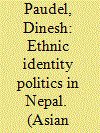|
|
|
Sort Order |
|
|
|
Items / Page
|
|
|
|
|
|
|
| Srl | Item |
| 1 |
ID:
145853


|
|
|
|
|
| Summary/Abstract |
The ethnic issue has dominated Nepal’s political landscapes since the birth of the Republic of Nepal in 2007. For decades, Nepal witnessed a series of peasant rebellions against the state and landed aristocrats. Ethnic peasants were at the forefront, demanding autonomy, dignity, and an end to state violence. Since the 1980s, however, the ‘ethnic question’ has become a development issue and the developmental idea of indigeneity has consolidated both ethnic elites and peasants. Recently, identity politics has become a dominant ideological force, rapidly unraveling the course of radical political developments in the country. Interestingly, this political movement emerged in a particular historical conjuncture where Nepali politics has been extensively shaped by the recent Maoist revolution and a long history of international development. This paper explores various aspects of ethnic peasantry and argues that the notions of indigeneity and identity politics have reinforced elite domination by depoliticizing ethnic peasant politics in Nepal.
|
|
|
|
|
|
|
|
|
|
|
|
|
|
|
|
| 2 |
ID:
172808


|
|
|
|
|
| Summary/Abstract |
The 2015 earthquakes in Nepal killed more than 9,000 people, displaced millions of people and deeply affected the economy. The earthquakes and reconstructions processes also transformed Nepal into a complex terrain of geoeconomic accumulation and geopolitical manoeuvring, including major international capital flows, the promulgation of a new constitution, an economic blockade by India and the expansion of trade corridors with China. Building on critiques of ‘disaster capitalism’, we propose and mobilize the concept of ‘geo-logics of power’ to draw further attention to the materialities of geopolitical and geoeconomic processes shaping reconstruction in post-earthquake Nepal. Focusing on two trans-Himalayan corridors connecting Nepal and China, we argue that the Nepal experienced a particular form of disaster capitalism: one in which the geo-logics of power – including trans-Himalayan discourses, practices, and materialities – came to shape political and economic transformations of a country long portrayed as a ‘buffer’ state between Indian and China. More broadly, we suggest that geo-logics of power result from a combination of geopolitical and geoeconomic power dynamics informed by geological formations and associated socio-natural processes.
|
|
|
|
|
|
|
|
|
|
|
|
|
|
|
|
|
|
|
|
|